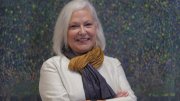Martha Tedeschi, Cabot director of the Harvard Art Museums (HAM) since 2016, announced today that she will retire at the end of this academic year, next June 30. During her tenure, the renovated museums’ complex, which reopened in 2014, ramped up programming and public access: the announcement of her retirement cited major exhibitions on, among other subjects, the Bauhaus, Winslow Homer, a significant collection of Japanese art, and, most recently, American watercolors; and the announcement this past June that admission would henceforth be free for all visitors. The latter initiative built upon the museums’ free Sundays and monthly Thursday evenings—measures that helped rebuild attendance after the COVID-19 pandemic forced the institution to close to visitors in March 2020.
In the announcement, Provost Alan M. Garber hailed Tedeschi for raising an “eloquent voice for the power of art to enrich our lives, to connect us with our past, and to foster understanding across cultures.” Tedeschi said, “I am enormously grateful for the opportunity to work with such a talented staff and for all that we have achieved together over these past seven plus years. I also am filled with confidence about the future of this remarkable institution…. It has been a true honor to be at the helm of an institution so completely dedicated to research, teaching, professional training, and expanded public access and a joy to work across disciplines and in collaboration with students, faculty, university leadership, and the public.”
Among the museums’ major accessions during her tenure was the gift of 330 Dutch, Flemish, and Netherlandish drawings from the Maida and George S. Abrams ’54, J.D. ’57, collection, in 2017.
In a message to the community, Garber said Tedeschi had “worked to strengthen the foundation of the museums—leading a robust strategic planning process and securing accreditation from the American Alliance of Museums—all while maintaining an unwavering commitment to excellence.” Among her parting contributions to the institution may have been a step to secure HAM’s smooth functioning during the transition through the recent appointment of Micha Winkler Thomas as the new deputy director responsible for an array of administrative operations, effective next Monday. Several curatorial appointments have been announced recently, as well, including Mitra Abbaspour (Houghton curator of modern and contemporary art), and Laure Marest (Damarete associate curator of ancient coins).
A search for a successor director will begin immediately.
Read the University announcement here.









